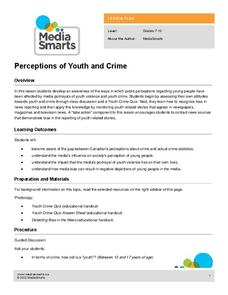Curated OER
Magazine Production
Analyze magazines as a class, looking carefully for the target audience, advertisements, and topics presented. Small groups then work as a publication team and receive a magazine that they have to "sell." Each individual has a different...
Media Smarts
Perceptions of Youth and Crime
Explore the potential for bias in the news and in scholars' own attitudes and opinions. Begin with a quiz on youth crime to see how learners perceive crime among their peers. After looking at the correct answers, put individuals in...
Media Smarts
You Be the Editor
Look at different case studies to discuss the ethics of journalism. Twelve real-life events are written up and your learners get to be the editors. Encourage your class to think about the implications of publishing decisions. After each...
Curated OER
Introduction to the Romantic Age of English Literature
Introduce your class to the elements of Romanticism with these slides. The foundations of the movement, the roles of imagination and nature, and the value of art are all highlighted. Features of Romanticism are explained such as...
PBS
The Pursuit of Excellence
Who doesn’t love French pastries and the idea of hard work? Discover different philosophies on hard work, and the skills of French pastry chefs as the documentary concerning the “Best Craftsmen in France” or Meilleures Ouvriers de France...
Curated OER
Toulmin Argument Essay
After viewing a Prezi presentation on Toulmin’s argument, (claim, reason, warrant, backing, grounds, qualifiers, rebuttals), groups re-examine the format, and then individuals craft an argument essay in response to Lord Chesterfields...
Curated OER
QAR: Question Answer Relationships Strategy: The Catcher in the Rye
Encourage readers to think deeply about text with a reading strategy that promotes active comprehension. Individuals develop questions on four levels (right there, think and search, author and you, and on my own). Step-by-step directions...
Alabama Learning Exchange
J. Alfred Hyperbolizes
Mermaids will sing to your class members as they engage in an activity related to T.S. Eliot's famous dramatic interior monologue. After engaging in a socratic seminar about literary devices in the poem, individuals choose one...
Alabama Department of Archives and History
Strange Fruit: Lynching in America
To continue their study of the Civil War, Reconstruction, and the beginning of the civil rights movement, class members watch the YouTube video of Billie Holiday singing "Strange Fruit" as an introduction to an examination of...
Curated OER
"The Island of Plenty": Reading Guide
Johnson C. Montgomery’s controversial plea for American social isolationism, “The Island of Plenty,” launches an in-depth study of the structure and logic of the essay. After responding to a series of questions, individuals craft a...
C.S. Lewis Foundation
Study Guide to The Four Loves
This well-designed, and easy-to-understand study guide is a goldmine in understanding the ideas and philosophies of C.S. Lewis’s The Four Loves. The resource easily breaks down the four loves (affectionate, friendship, romantic, and...
Shakespeare Uncovered
Henry IV, Part I: Does Father Know Best?
“Yea, there thou mak’st me sad and mak’st me sin/In envy that my Lord Northumberland/Should be the father to so blest a son--.” Henry IV, Part I, provides the text for a series of exercises that ask class members to examine the...
Shakespeare Uncovered
“Speak, I Charge You”: Macbeth On Your Feet, Not In Your Seat
“Is this a dagger which I see before me . . .” As part of a study of Macbeth, class members engage in a series of activities that get them up and moving. Individuals practice, then deliver, a line from the Scottish play. The entire class...
National Research Center for Career and Technical Education
Finance: Depreciation (Double Declining)
Of particular interest to a group of business and finance pupils, this lesson explores depreciation of automobile values by comparing the double declining balance to the straight line method. Mostly this is done through a slide...
EngageNY
Science Talk: How do Bullfrogs Survive
Following the reading of the book Bullfrog at Magnolia Circle, the ninth lesson in this unit involves emerging experts in a science talk about how bullfrogs survive. Looking back through the text, young scholars prepare for the...
Scholastic
Study Jams! Mosses and Ferns
Mosses and ferns are some of the world's oldest types of plants. Here is a quality 10-slide presentation set to gentle background music for beginning botanists to view and enjoy. Accompanying captions explain that these are both...
Scholastic
Study Jams! The Digestive System
Mostly made up of colorful diagrams, this presentation winds through the digestive system. Beginning with the mouth, passing by the liver, and then leaving the body, viewers examine the length of the digestive system on captioned slides....
Scholastic
Study Jams! The Nervous System
Get your class thinking with animations of neurons in action and explanations of how stimuli is transported and processed. This film makes an ideal introduction or review of the nervous system. The parts of the brain and what they...
Scholastic
Study Jams! Skeletal System
A dazzling display colorful computer-generated images, x-rays, and photographs create a comprehensive introduction to the skeletal system. With 12 slides in all, aspiring anatomists learn that there are 206 bones in the human body and...
McGraw Hill
The Wellness Triangle
Health is not simply the absence of disease or a one-dimensional notion, but is really a combination of physical, emotional, and social components. Discover the wellness triangle, which not only includes signs of health and ways to...
Curated OER
"Their Eyes Were Watching God": Folk Speech and Figurative Language
Using or considering using Zora Neale Hurston's Their Eyes Were Watching God? Then this packet is a must for your curriculum library. The examination of how Hurston combines folklore and folk language to create the voice of her...
Baylor College
Crossing the Synaptic Gap
As part of a unit on the chemistry of the brain, thinkers learn how chemicals work to transmit messages between individual neurons and how controlled substances impact the synaptic cleft. They do so by playing a dice-and-card game in...
Baylor College
What Is a Neuron?
Your class won't get on your nerves while doing this modeling activity! After teaching the structure and function of a neuron using the included diagrams, give individuals some clay and chenille stems so that they can make their own...
Illustrative Mathematics
What is a Trapezoid? (Part 1)
Challenge your class to construct a definition for trapezoids. Looking at four examples and four non-examples, students individually create definitions and use them to classify an unknown shape. Allow for small group and whole-class...
Other popular searches
- Individual Rights
- Individual Responsibility
- Individual Traits
- Individual Differences
- Individual Resources
- Individual Sports
- Individual States
- Individual Family Roles
- Individual Protest
- Individuality vs Conformity
- Important Individuals
- Individual Growth





















